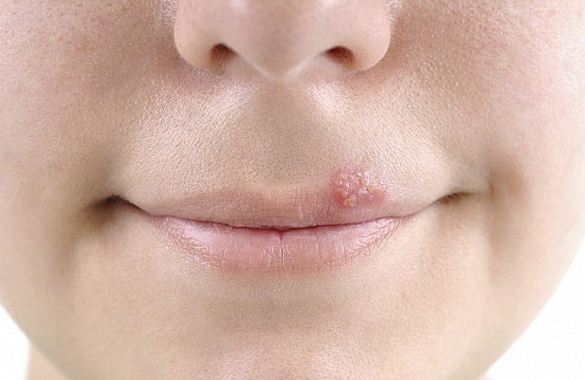


Herpes simplex is a common viral infection that spreads from person-to-person contact and the sharing of contact objects.
If you’ve ever had a cold sore or fever blister, chances are that you’ve picked up the herpes simplex virus. Most cold sores are caused by herpes simplex virus type 1 (HSV-1). Other names for cold sores caused by HSV-1 are:
Herpes simplex viruses spread from person to person through close contact. You can get the herpes simplex virus from touching a herpes sore. Most people, however, get herpes simplex from an infected person who does not have sores. This is also known as “asymptomatic viral shedding.”
Both types of herpes viruses can cause recurrent outbreaks of blisters or sores, along with symptoms such as itching, pain, and a tingling sensation. The initial infection may also present flu-like symptoms, including fever, body aches, and swollen lymph nodes. After the initial infection, the virus remains in the body and can periodically reactivate, leading to recurrent outbreaks
Although there is no cure for herpes, most sores often clear without treatment. Despite that, treating herpes is critical to relieve symptoms and minimise flare-ups.
Prescription antiviral medicines approved for the treatment of both types of herpes simplex include:
Individuals who get herpes may not see or feel anything. If you start noticing the signs and symptoms of herpes simplex, this is the average time it takes for them to go away:
Oral (mouth) herpes: two to three weeks
Genital herpes: two to six weeks (the first outbreak). In the case of visible signs or sensations, these are the common symptoms of herpes.
Tingling, itching, or burning: Before the appearance of blisters, you may experience a tingling, itching, or burning sensation.
Sores: Patients may also develop painful, fluid-filled blisters. These blisters break open, often ooze fluid, and form a crust before healing. The first time sores appear, they will show up between 2 and 20 days after a person has contact with an infected person. The sores can last from 7 to 10 days. Where the sores appear often varies with type:
Oral herpes (HSV-1): Most blisters appear on the lips or around the mouth. Sometimes blisters form on the face or on the tongue. Although these are the most common places to find oral herpes, the sores can appear anywhere on the skin.
Genital herpes (HSV-2): Sores typically occur on the penis, vagina, buttocks, or anus. Women can have sores inside the vagina. Like oral herpes, these sores can appear anywhere on the skin.
Flu-like symptoms: Fever, muscle aches, or swollen lymph nodes (glands) in the neck (oral herpes) or groin (genital herpes) are possible.
Problem in urinating: Patients, mostly women, who have contracted genital herpes may have trouble urinating or have a burning feeling while urinating.
An eye infection (herpes keratitis): Sometimes the herpes simplex virus can spread to one or both eyes. If this happens, you can have pain, light sensitivity, discharge, and a gritty feeling in the eye. Without prompt treatment, scarring of the eye may result. Scarring can lead to cloudy vision and even loss of vision.
Herpes simplex outbreaks usually develop around the mouth or on the genitals, but the sores can appear almost anywhere on the skin.
Herpes is not just a disease that brings discomfort; the stigma attached to herpes can also affect one’s self-esteem and inability to make the most of one’s life.
Herpes cannot be cured, but the flare-ups can be managed. Although Herpes simplex virus is rarely life-threatening for most people with it, it’s extremely dangerous for pregnant women.
During an outbreak, an experienced dermatologist often can diagnose herpes by examining the sores. To confirm that a patient has herpes simplex, a dermatologist may take a swab from a sore and send this swab to a laboratory.
When sores are not present, other medical tests, such as blood tests, can find the herpes simplex virus.
With DermaSure, you can get relief from Herpes using clinically proven techniques. We are committed to providing you with quality treatment through our expertise and the latest technology.
Your single solution to Herpes & other skin ailments is here – consult top dermatologist in Delhi at DermaSure and get immense relief with the best clinical solutions!
While herpes cannot be completely prevented, there are measures you can take to reduce the risk of transmission. Using condoms or dental dams during sexual activity, avoiding sexual contact during outbreaks, and maintaining open communication with sexual partners about herpes status are important preventive measures. It’s also essential to practise good personal hygiene, such as regularly washing hands and avoiding touching or scratching the affected area.
Yes, it is possible to have a fulfilling and healthy sex life with herpes. By taking proper precautions, such as using condoms or antiviral medications, and discussing your condition openly and honestly with your partner, the risk of transmission can be significantly reduced. However, avoid getting involved with non-infected individuals, as it may increase the risk of them contracting Herpes.
The most perfect way to decide in case somebody is contaminated with HSV-1 or HSV-2 is to perform a research facility investigation on a test from a new herpes sore. But, since not everybody with herpes has symptoms, you can get a blood test that can distinguish antibodies to herpes infections.
To avoid transmitting or contracting genital herpes is to maintain a strategic distance from sexual contact totally or to be in a monogamous relationship with somebody who has tried negative for the infection. In any case, for numerous individuals, not one or the other choice is reasonable.
Submit your review | |
Leave Them To #1 Skin & Hair Specialist In Delhi